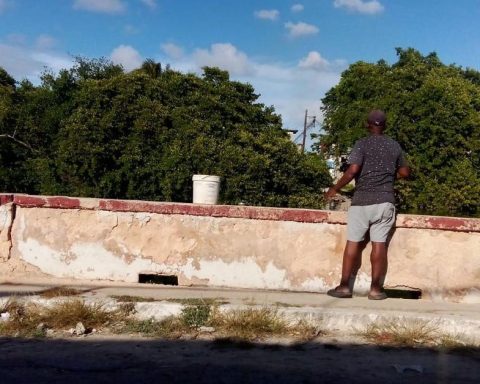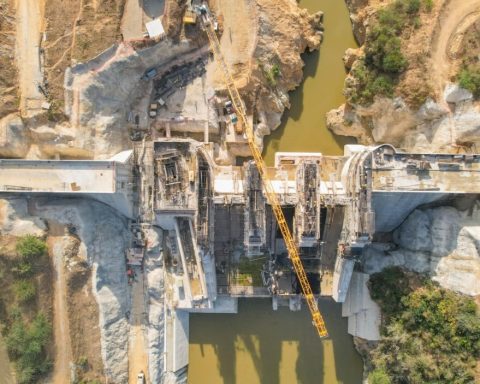On Thursday morning, La Moneda is shaken by the death of Corporal Daniel Palma. Outside the Palace, on Morandé street, there are some demonstrators in solidarity with the Carabineros and in Teatinos there are several mayors of Chile We are declaring to the media after leaving a letter to President Gabriel Boric.
The Undersecretary for Regional Development, Nicolás Cataldo, is aware of the complex moment, but considers that the Executive is acting accordingly as a block.
Cataldo manages to get out of the contingency to respond to the governor of Santiago, Claudio Orrego, who on Sunday had said that he had a “reserved” diagnosis regarding the decentralization will of the Boric administration. Being precisely in charge of the subject, Nicolás Cataldo responded to the governor of Santiago: “What Claudio Orrego says about the fact that nothing has been done in decentralization is not effective” and he begins to explain the details.
Isn’t decentralization a priority for this government?
-The president said when he took office: “I want to end my term with less power than I entered with.” What he is saying is that we need to pass capabilities to the regions that are now at the central level.
-What have they done about it?
-We have done intense interaction work with regional governments. We had a forum in Frutillar, which brought together all the regional governors and several ministers attended.
-Whats Next?
-This resulted in an Interministerial Decentralization Committee, which is made up of Segpres, Interior and Finance ministers, chaired by Interior and whose executive secretariat is the Undersecretariat for Regional Development (Subdere). In that meeting in Frutillar, the governors defined six transfers of powers from the central government to the regions.
-What are the skills?
-It is transferring things that are happening at the central level so that they begin to occur and be exercised from the regional level. Piñera ex officio 15 powers that were transferred to regional governments by ex officio. There was no dialogue, they simply transferred. Governor Orrego himself asked us to invalidate those powers because they did not come with resources, because they were not discussed or because they did not make sense to him for different reasons.
-There were several governors who rejected powers that the central government gave them. What does this imply?
-The decentralization process is beginning to be implemented. The process of transferring powers was not successful for them or for us. And that’s why we changed the focus of the competition transfer look. In fact, Governor Orrego in the interview raises it as an alternative.
-And what is that alternative?
-It is established in the agreement that we signed on January 19 in Antofagasta and where the evaluation we made was “we need to strengthen the axis of the transfer of competence with a more particular look at what each region needs and wants.”
-Orrego says that this government has not advanced in decentralization. Is there progress to show?
-We have advanced. I share with Orrego that more progress can be made. My main difference with the Governor is that today there is a roadmap that has been outlined and discussed with them and that we are implementing.
-Which?
-For example, we compromised in the agreement of January 19 an indication to resolve the issue of the Presidential Delegate. That is committed and the deadline is May to resolve the issue of the figure of the Presidential Delegate that the governors have questioned. There are a couple of months left before that deadline is met and we are working on it within the framework of the redesign of the Ministry of the Interior.
-Why Orrego’s criticism?
-I have the impression that Governor Orrego is pressing to be able to move faster, he is also pressing because it is a delicate political moment in which obviously it will be easier to enter into the discussion. The important thing is that we have a stable agenda with the governors that we are fulfilling.
But what are the concrete advances?
-We have made a lot of progress in terms of fiscal decentralization. In fact, the budget of the regional governments, for the first time in history, comes from the Ministry of the Interior and becomes a part of the regional governments. It is a very powerful sign of fiscal autonomy.
-How will the transfer of powers or functions be carried out?
-To transfer services we need to legislate. This is defined to be entered in the month of June, it is a bill to modify the procedure for the transfer of powers and incorporate the transfer of services, an advance that the governors highly valued. A good part of the elements that the Governor raises as criticism are things that must be legislated and that have a specific timing.
– All this depends on the Subdere?
-We are also formulating a National Decentralization Policy through a participatory process with regional governments. That national policy is going to be the umbrella for this to be ordered.
-When do you define the powers that will be transferred to the regional governments?
-In March we raised with the regional governments 47 competences that they themselves identified. There is a job that we expect to close between now and June. This has a roadmap that is also legal. In other words, once the process has started, we have legal deadlines that are inexorable. They are established by law. Then the time will come when there has to be a supreme decree from the President that says these are the powers to be transferred and let’s go.
– Is everything slow?
-There are other processes that have been advancing more expeditiously. For example, in the case of Magallanes, the administration of the free zone concession was transferred to the regional government. It is a discussion that is open. If it was done in Magallanes, it could be done in Iquique.

















